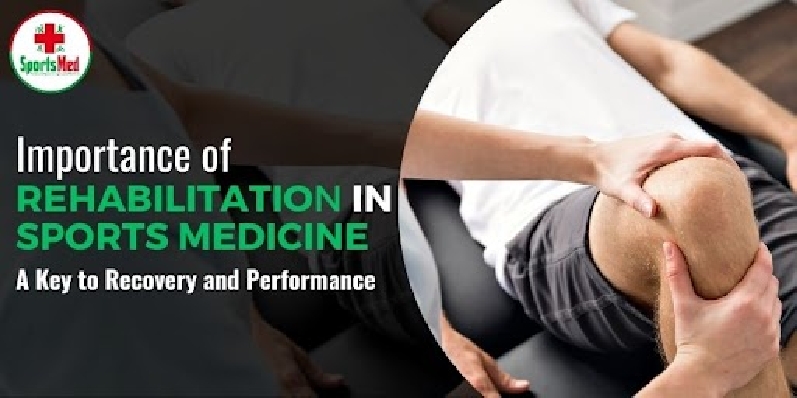
Importance of Rehabilitation in Sports Medicine: A Key to Recovery and Performance
Rehabilitation in sports medicine is the most crucial aspect of guiding athletes back to full performance after sustaining injuries that necessitate recovery and restoration of strength and mobility. It encompasses not only physical healing but also the mental and emotional challenges athletes face during their recuperation. A sprain, fracture, or ligament injury must be rehabilitated so that athletes not only recover but also return stronger and more resilient. This blog discusses the significance of rehab in sports medicine, its benefits, and how it can enhance an athlete's short-term health while also impacting their long-term well-being.
1. Rehabilitation Ensures Proper Healing and Recovery
A crucial aspect of rehabilitation ensures that injuries are fully healed. When this is not integrated into the rehabilitation process, it often leads to re-injury or chronic issues. This approach enables the athlete to regain full function through a program that restores mobility, flexibility, and strength. These exercises promote healing by strengthening the muscles, helping to reduce inflammation, and thereby facilitating the return of joint movement.
2. Prevention of Re-injury
One of the primary objectives of rehabilitation in sports medicine is to prevent re-injury. When not integrated into the rehabilitation process, it often leads to re-injury or chronic issues. This program enables the athlete to regain full function by restoring mobility, flexibility, and strength. These exercises promote healing by strengthening the muscles, helping to reduce inflammation, and thereby facilitating the return of joint movement.
3. Psychological Benefits of Rehabilitation
Injury frequently causes mental distress for athletes, leading to anxiety, frustration, or even depression due to their inability to perform. Rehabilitation offers psychological benefits as athletes confront the emotional toll of being sidelined. Implementing goal-setting, encouragement, and gradual progress in their practice can help restore psychological confidence and mental resilience. Often, physical therapists serve as emotional support for athletes, witnessing the ups and downs throughout their recovery.
4. Customised Recovery Plans
Rehabilitation in sports medicine is not a one-size-fits-all solution. Each injury is different, and every athlete has unique needs depending on their sport, injury severity, and physical condition. Programs in sports rehabilitation, therefore, are tailored to meet specific requirements in terms of recovery timelines, specific Exercises and functional training that replicate the demands of the athlete's sport. This method ensures effective rehabilitation, enabling athletes to return more safely and promptly to their sport.
5. Focus on Functional Training
Rehabilitation programs in sports medicine emphasise functional training, aiming to restore the skills and movements pertinent to an athlete's specific sport. This may include sprinting, jumping, throwing, or rapid directional changes; rehabilitation exercises are centred on the actual movements athletes perform in their respective sports. Consequently, the body must adapt to the physical demands of the sport when the athlete returns to their activities, thereby reducing the risk of injury.
6. Improved Long-term Health
In the athlete's rehabilitation process, overall health improves, not just the immediate site of injury. Developing muscular endurance, increasing flexibility, and establishing proper biomechanics enhance long-term athletic performance and reduce the likelihood of future injuries. Properly rehabilitated athletes are more likely to enjoy longer, healthier careers and a better quality of life after retirement.
7. Enhances Athletic Performance
Besides recovery, rehabilitation significantly enhances overall athletic performance. Athletes often discover that after completing their rehabilitation program, they return stronger and more attuned to their body mechanics. Rehabilitation enables athletes to effectively address their muscle imbalances, posture, and movement patterns, maximising their physical potential and leading to improved performances in their respective fields or courts.
Conclusion
The significant role of rehabilitation in sports medicine aids athletes in fully recovering to prevent re-injury and achieve optimal long-term health. It serves as a holistic approach for healing both the physical and psychological aspects of recovery. For athletes, rehabilitation signifies not only returning to the game but also coming back stronger, faster, and more resilient than before. This enables them to perform at their best for as long as possible.
Dedicated WhatsApp Helpline:
To further support our patients, we provide a dedicated WhatsApp helpline at 9587077444. You can send your MRI scans directly to us for expert analysis and personalized guidance. This service ensures that you receive timely advice and helps you make informed decisions about your treatment options.
Look over video to know our helpline and campaign services to help you –https://www.youtube.com/live/liOPy8yPZNw?si=gycp-4MNXUv30xDK